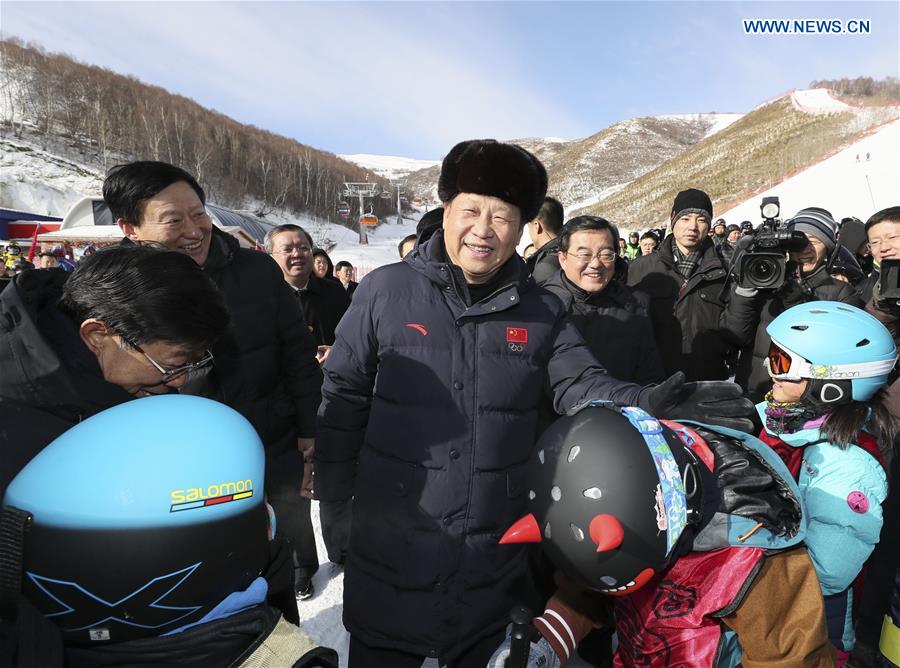
Chinese President Xi Jinping encourages children attending skiing winter camps at Genting Ski Resort as he inspects preparatory work for Beijing 2022 Winter Olympic Games in Zhangjiakou City, north China's Hebei Province, Jan. 23, 2017. (Xinhua/Lan Hongguang)
BEIJING, Jan. 24 (Xinhua) -- Having just concluded a heartwarming visit to snow-covered Davos in Switzerland, Chinese President Xi Jinping on Monday traveled to Chongli ski area in north China's Hebei Province to inspect preparation for the 2022 Beijing Winter Olympic Games.
From the World Economic Forum (WEF) to the exciting global sporting venue, the spirit held by the Chinese president is consistent -- sharing, openness, effectiveness and sustainability.
In a historic visit to the International Olympic Committee (IOC) headquarters in Lausanne, Switzerland last week, Xi "showed the excellent cooperation between China and the IOC," as noted by IOC President Thomas Bach, adding an important chapter to Xi's sports diplomacy.
The Chinese head of state has indeed been busy bringing Chinese wisdom and proposals to the world through multilateral platforms, especially since last year.
In September, Xi hosted the G20 Hangzhou Summit under the theme "Toward an innovative, invigorated, interconnected and inclusive global economy," setting out China's policies on global governance and solutions for world economic recovery in a series of speeches.
In October, Xi attended in Goa, India a summit of the BRICS grouping Brazil, Russia, India, China and South Africa, and jointly issued a declaration pledging an enhanced role of the emerging-market bloc in the global governance system.
In November, Xi urged members of the Asia-Pacific Economic Cooperation (APEC) forum to stay committed to taking economic globalization forward with vigorous measures, in a speech at the APEC Economic Leaders' Meeting in Peru.
"China aims to tackle the problems of inequality, exclusiveness and inefficiency in the previous globalization process and provide better global governance products for the world," said Fan Yongpeng, an associate professor with the China Institute of Fudan University.
"Since the G20 Hangzhou Summit, we have heard more of China's sober, rational and constructive voice at a time when no one is willing to take on a leading role," Fan said.
In his first overseas visit to Switzerland and the WEF annual meeting in January, 2017, Xi injected some much needed confidence in the development of the global economy against the backdrop of sluggish growth and rising anti-globalization sentiment.
Analyzing the root causes of the sluggish global economy and the problems for which globalization has been made the scapegoat, Xi pointed to a lack of robust driving forces for global growth, inadequate global economic governance, and uneven global development.
He stressed the importance of developing a dynamic innovation-driven growth model, a model of open and win-win cooperation featuring a well-coordinated and inter-connected approach, and a model of fair and equitable governance in keeping with the trend of the times, and a balanced, equitable and inclusive development model.
Xi pledged that China's development will continue to offer opportunities to business communities in other countries with steadily increasing investment, reliable free trade agreement and win-win development projects such as the initiative on the construction of the Silk Road Economic Belt and the 21st Century Maritime Silk Road, popularly known as the Belt and Road Initiative.
The Belt and Road Initiative, proposed by China in 2013, aims to build a trade and infrastructure network connecting Asia with Europe and Africa along the ancient Silk Road trade routes. It has won support from over 100 countries and international organizations.
Recalling the Chinese president's addresses from the APEC meetings in the Philippines in 2015, to the G20 Hangzhou summit in 2016 and now to the 2017 Davos forum, Jack Ma, the founder and executive chairman of Alibaba Group, said he saw China's increasingly mature role on the world stage, and growing leadership and accountability as a big country.
President Xi's instinct and foresight are impressive, he told Xinhua, "He saw today from the future, and saw China from the world."
Xi's visit to the U.N. Office at Geneva (UNOG) last week, in which he expounded the concept of building a community of shared future for mankind, was not only the first by a Chinese head of state in the 21st century, but also a significant move of China's multilateral diplomacy.
Following Xi's keynote speech at the Palace of Nations in Geneva, Peter Thomson, president of the 71st U.N. General Assembly, and U.N. Secretary-General Antonio Guterres both pledged that the U.N. is willing to join China in promoting world peace and development, and in realizing the goal of building a community of shared future for mankind.
After the successful multilateral diplomacy tour at the beginning of the year, the Chinese president continues to prepare for a host of events with global significance, including a Belt and Road forum for international cooperation in Beijing in May, and the ninth BRICS leaders' summit in southeast China's coastal city of Xiamen in September.


